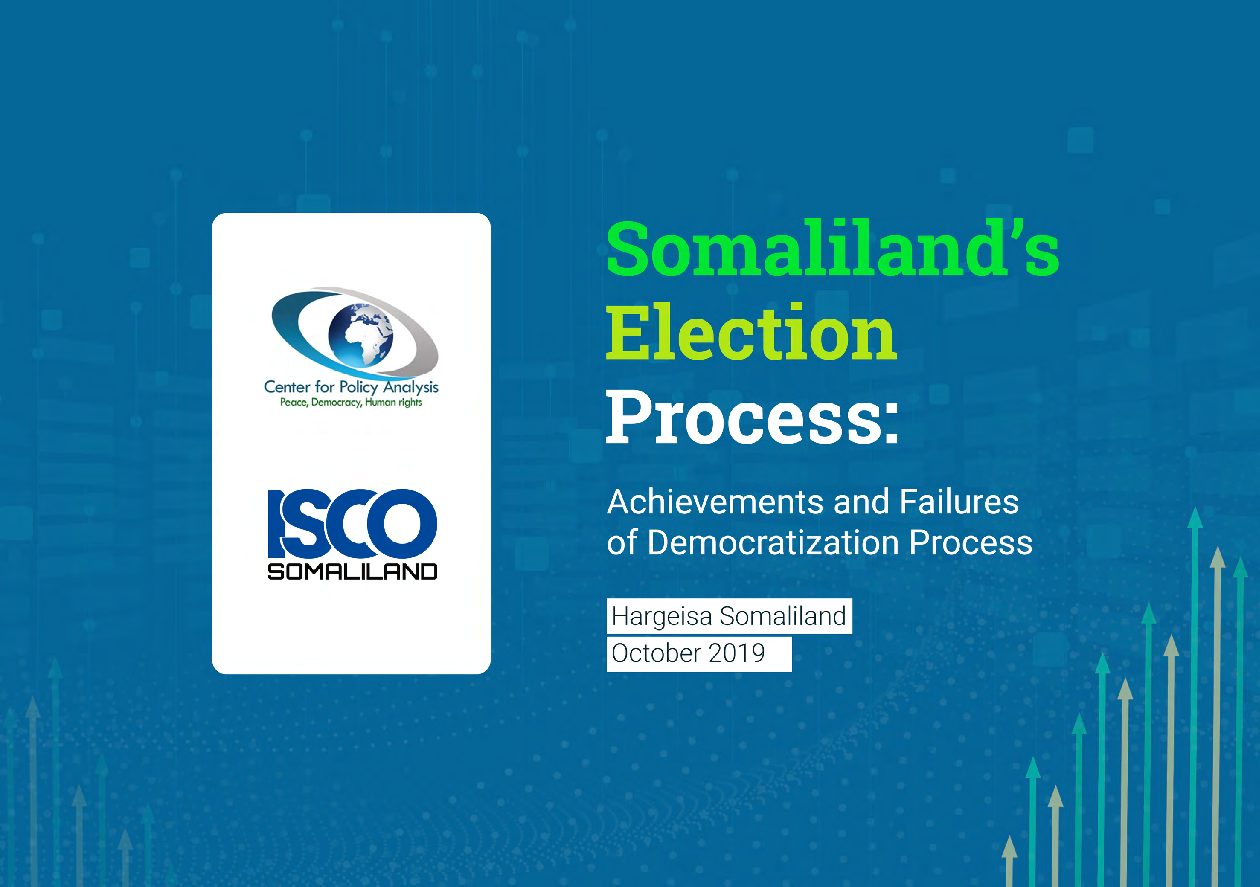Today, The Centre for Policy Analysis, a think tank based in Somaliland, and the coalition of Independent Somaliland Civil Society Organisations (ISCO Somaliland) released a report explaining the election history of Somaliland with facts and figures. The report is important in giving full data and information regarding all elections that happened in Somaliland, dates of extensions, voter registration and election results. The objective is to provide needed information and data to help policymakers, partners and practitioners.
On 18 May 1991, after suffering 21 years of the brutal military dictatorship of General Siyad Barre and experiencing three decades of marginalization as part of the United Somali Republic, Somaliland unilaterally reclaimed its pre-union independence from Somalia. In the following years, a nascent democratic system was established. A National Charter was approved by consensus soon after the withdrawal of the union, in which it was agreed that government would be based on a system of power-sharing between clans. This transitional arrangement was then superseded by a national constitution of the republic, which was confirmed near-unanimously by a national referendum in 2001, in which 97% of voters approved. With its approval, the constitution legally ushered in the progression for a clan-based politics to a multiparty democratic system.
Read here Somaliland’s Election Process: Facts on elections, report
Since then, Somaliland has held six successful democratic elections, including three presidential elections (in April 2003, June 2010 and November 2017), one parliamentary election (in September 2005) and two local council elections (in December 2002 and November 2012). All aforementioned elections were conducted in a peaceful and inclusive manner, a very rare occurrence in this volatile Horn of Africa region, which is overwhelmingly dominated by long-sitting, undemocratic and authoritarian leaders. Beyond that, in 2016, Somaliland conducted the most advanced voter registration processes in Africa, according to Abdikadir Iman Warsame, Chairman of the National Electoral Commission (NEC) of Somaliland, in which an iris-based biometric system was used for one of the first times anywhere in the world.
Although Somaliland has been exercising multiparty democracy for almost 18 years now, it has in many ways failed to institutionalize this system. Of the several major setbacks and shortcomings of the democratic process, one of the most serious and intractable is repeated election delays, in which extensions are granted to the term periods of Somaliland’s representative institutions. Such delays have occurred at all levels of government, from the executive and legislative to the local.
According to the revisions of the election timelines, Somaliland’s National Election Commission, become the only institution that never being extended their term during the last 17 years. |The House of Elders extended their own term in 9 times. They were selected in clan conference held in Hargeisa on 1997. The House of Elders also extended 9 times extended the term of the House of Representatives, 7 times the term of the President, and 3 times for the term of Local councils. The Political Parties delay their Central Committee conferences different times.
-
Somaliland held 1 Referendum, 6 elections (3 Presidential, 2 Local Council Elections and 1 Parliamentary), 2 times of voter registration and two times of voter card distribution. Somaliland carried out nearly 11 election-related activities since 2001.
-
The House of Elders made 28 extensions of terms during the last 18 years, including 3 times for Local Councils, 7 times of presidents, 9 times for the House of Representatives and 9 times for their House of Elders. The total of extensions that the House of Elders (Guurti) has made during the last 18 years was 45 years, 11 months and 2 days in total
-
The tenure of the current members of the Local Councils expired in 2017. The term of the House of Representatives expired in 2010. The term of the House of Elders lapsed in 2003.
-
The term of the committee responsible on regulating political parties, the Committee for Registration and Approval of Political Associations/Parties, expired in 2014.



















![New PM Starmer names first cabinet after landslide win British Prime Minister Keir Starmer looks on, at Number 10 Downing Street, following the results of the election, in London, UK, July 5, 2024 [Kevin Coombs/Reuters]](https://i0.wp.com/www.horndiplomat.com/wp-content/uploads/2024/07/2024-07-05T115520Z_52034812_RC2ZO8AP0G9J_RTRMADP_3_BRITAIN-ELECTION-1720202222.webp?resize=100%2C70&ssl=1)








